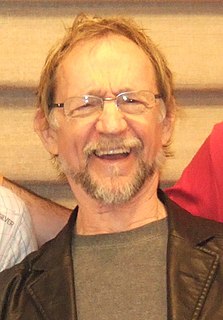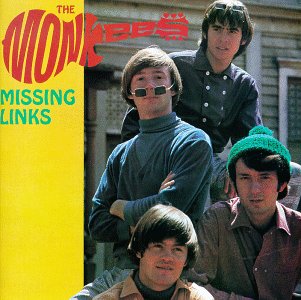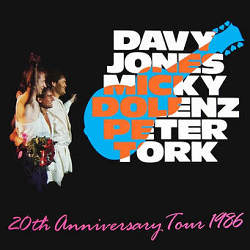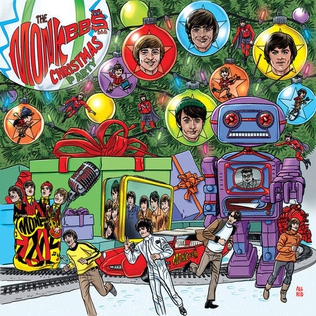
David Thomas Jones was an English musician, singer, actor and businessman. Jones is best known as a member of the band the Monkees, and for starring in the TV series of the same name.

The Monkees are an American rock and pop band originally active between 1966 and 1971, with reunion albums and tours in the decades that followed. Their original line-up consisted of the American actor/musicians Micky Dolenz, Michael Nesmith and Peter Tork with English actor/singer Davy Jones. The group was conceived in 1965 by television producers Bob Rafelson and Bert Schneider specifically for the situation comedy series of the same name, which aired from 1966 to 1968. The band's music was initially supervised by record producer Don Kirshner, backed by the songwriting duo of Tommy Boyce and Bobby Hart.

George Michael Dolenz Jr. is an American actor, musician, television director, radio personality and theater director, best known as a vocalist and drummer of the 1960s pop-rock band the Monkees.

Peter Halsten Thorkelson, known professionally as Peter Tork, was an American musician, composer, and actor who was best known as the keyboardist and bass guitarist of the Monkees.

Pisces, Aquarius, Capricorn & Jones Ltd. is the fourth album by the Monkees. It was released on November 6, 1967, when the Monkees were exerting more control over their music and had started to play many of the instruments themselves, something that their record company had previously forbidden. Pisces, Aquarius, Capricorn & Jones Ltd. sold more than three million copies and was also the band's fourth consecutive album to reach number one on the U.S. Billboard 200.

Headquarters is the third album issued by the Monkees and the first with substantial songwriting and instrumental performances by members of the group itself, rather than by session musicians and professional songwriters. After a struggle for creative autonomy with their record label, the group had been allowed, to a degree, to record by themselves. Headquarters reached No. 1 on the Billboard 200 chart and was certified double platinum in the United States with sales of more than two million copies within the first two months of release. It peaked at No. 2 on the UK charts. It is included in the 2006 book 1001 Albums You Must Hear Before You Die.

The Monkees Present is the Monkees' eighth album. It is the second Monkees album released after the departure of Peter Tork and the last to feature Michael Nesmith until 1996's Justus.

Douglas Farthing Hatlelid, better known as Chip Douglas, is a songwriter, musician, and record producer, whose most famous work was during the 1960s. He was the bassist of the Turtles for a short period of time and the producer of some of the Monkees biggest hits, including "Daydream Believer" and "Pleasant Valley Sunday".

"Daydream Believer" is a song composed by American songwriter John Stewart, shortly before he left the Kingston Trio. It was originally recorded by the Monkees, with Davy Jones singing the lead. The single reached No. 1 on the U.S. Billboard Hot 100 chart in December 1967, remaining there for four weeks, and peaked at No. 5 in the UK Singles Chart. It was the Monkees' last No. 1 hit in the U.S.

Missing Links is a compilation album of rare and previously unreleased songs by the Monkees, issued by Rhino Records in 1987. It is the first volume of a three-volume set, followed by Missing Links Volume Two in 1990 and Missing Links Volume Three in 1996.

Missing Links Volume Three is a compilation album of rare and previously unreleased songs by The Monkees, issued by Rhino Records in 1996. It is the third and final volume of a three-volume set, preceded by Missing Links in 1987 and Missing Links Volume Two in 1990.

Missing Links Volume Two is a compilation album of rare and previously unreleased songs by the Monkees, issued by Rhino Records in 1990. It is the second volume of a three-volume set, preceded by Missing Links in 1987 and followed by Missing Links Volume Three in 1996.
"Star Collector" is a song written by Gerry Goffin and Carole King in 1967 and recorded by The Monkees. The song is included on their fourth album Pisces, Aquarius, Capricorn & Jones Ltd. It was featured in five second-season episodes of their television series: "The Wild Monkees", "Hitting the High Seas", "Monkees Watch Their Feet", "Monkees in Paris" and "Monkees Mind Their Manor". "The Wild Monkees" uses an early mix of the song, and the other episodes use the released mix.

"Pleasant Valley Sunday" is a song written by Gerry Goffin and Carole King, most famous for the version recorded by the Monkees in 1967. Inspired by a street named Pleasant Valley Way and their move to suburban West Orange, New Jersey, Goffin and King wrote the song about dissatisfaction with the life in the suburbs.

"Randy Scouse Git" is a song written by Micky Dolenz in 1967 and recorded by the Monkees. It was the first song written by Dolenz to be commercially released, and it became a number 2 hit in the UK where it was retitled "Alternate Title" after the record company (RCA) complained that the original title was actually somewhat "taboo to the British audience". Dolenz took the song's title from a phrase he had heard spoken on an episode of the British television series Till Death Us Do Part, which he had watched while in England. The song also appeared on The Monkees TV series, on their album Headquarters, and on several "Greatest Hits" albums. Peter Tork said that it was one of his favorite Monkees tracks.
Dolenz, Jones, Boyce & Hart was a supergroup, consisting of songwriting/performing duo Boyce and Hart and the two remaining members of the Monkees, Micky Dolenz and Davy Jones. Boyce and Hart had written many of the Monkees' biggest hits, such as "Last Train to Clarksville" and "(Theme From) The Monkees". The group existed only for a short time in 1976, recording one eponymous album.

20th Anniversary Tour 1986 is a live album by the Monkees recorded during their successful 20th Anniversary Tour in 1986. To date, it is the only known complete concert recorded during this era. The recording was available at 1987 tour stops in double-LP and cassette formats, though a planned 1988 retail release by Rhino Records was ultimately scrapped. The record credited the artist as Davy Jones / Micky Dolenz / Peter Tork to avoid paying royalties to Arista Records who owned the Monkees trademark at the time, though the band's logo is visible on the sleeve. A limited-edition CD was released in 1994 under the title Live! by the group's fan club in Nashville, and was sold at concerts during their 1996 tour.

The Definitive Monkees is a limited edition Monkees compilation album released in 2001. It contains 29 of the Monkees' greatest hits. The album includes two tracks from the 1980s reunions. The album featured a bonus disc which featured 31 of The Monkees' rarity songs.

Christmas Party is the 13th album by The Monkees, released on October 12, 2018. Produced mainly by Adam Schlesinger, the album is the Monkees' first to focus on Christmas themes. It follows on the success of their 2016 album Good Times! The two-year gap is the shortest between albums since the 1969/1970 releases of The Monkees Present and Changes. The album features surviving Monkees Micky Dolenz, Mike Nesmith, and Peter Tork, as well as two posthumous contributions from Davy Jones. It is the final Monkees album to be released prior to Tork's death four months later on February 21, 2019.
"Words" is a song written by Tommy Boyce and Bobby Hart and released by the Monkees. An early version by the Leaves appeared on their 1966 album Hey Joe. The Monkees first recorded the song for their second album, More of The Monkees, in August 1966 under the supervision of Boyce and Hart. While this version went unreleased until the 1990 compilation Missing Links Volume Two, it was featured in the 10 April 1967 episode of The Monkees "Monkees, Manhattan Style". A new version of the song was made to be the B-side of "Pleasant Valley Sunday" in 1967, now produced by Chip Douglas.

















